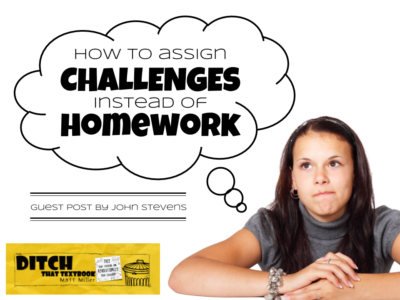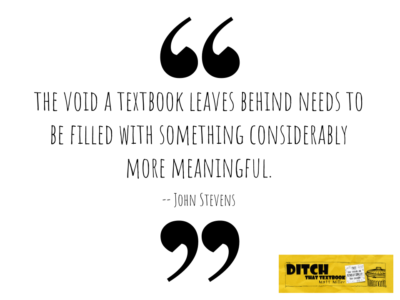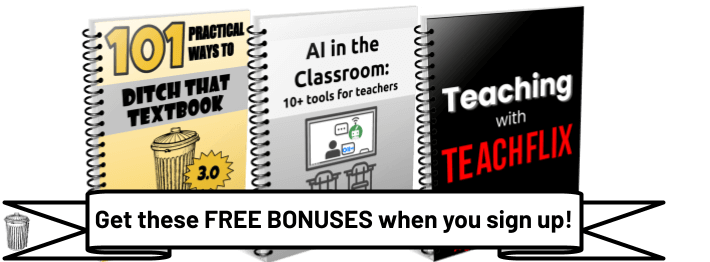

Students can do powerful learning outside of class. But how do we keep it from being “traditional homework”? The answer may be challenges and puzzles. (Public domain image via Pixabay.com)
At the same time, being a math teacher puts me in a tough place with the parents and guardians of my students.
After all, they’re used to seeing homework sent home with their kids. They grew up with textbook problems when they were kids.
Some are questioning how they can help prepare their children at home without a textbook.
Perfect.
I am the father of two boys and recently ran into a similar predicament with my oldest son.
My son’s teacher, who is phenomenal, wasn’t sending home any math work.
While some may sigh in relief, I was a bit concerned that he wasn’t getting the additional practice that I wanted him to. I’m not talking about the worksheets or textbook pages with 30 problems in them; I’m talking about the deeper understanding and application of mathematics in a curiosity-piquing and friendly environment.
If our children don’t feel comfortable doing something at home, how can they be comfortable doing it at school? With that in mind, I did something about it.
First, I started a free weekly newsletter called tabletalkmath.com that gives a quick prompt to try at home. The goal here is to start a conversation at the dinner table, in the car on your way to an event, or during an evening walk when you get that precious time with your child(ren).
The prompts shouldn’t take long, and don’t require much, but they give us a chance to think deeper about a concept and engage in meaningful conversation.
Oh, and it also helps that we get to wrestle through some of the problems together without saying “I was never any good at math” or any phrase similar to it.
For example, check out this prompt from fractiontalks.com, built by Nat Banting:
What fraction of Thailand’s flag is red? How about blue? And white? How did you come to that conclusion?
The ideas shared through the weekly newsletter became popular, and it got me thinking about my upbringing. Why was I so confident when it came to math? To what/whom can I attribute my math-based success?
The answer was most definitely my parents, who both found ways to challenge me and my brother, put games and puzzles in front of us, and encourage us constantly to embrace the struggle in problem solving.
 With that, I wrote my latest book, Table Talk Math, available on Amazon now. However, I didn’t want it to be exclusively my voice. If you’re going to ditch the math books, you need to replace them with something that is even more meaningful.
With that, I wrote my latest book, Table Talk Math, available on Amazon now. However, I didn’t want it to be exclusively my voice. If you’re going to ditch the math books, you need to replace them with something that is even more meaningful.
To bring in the heavy hitters, I asked Andrew Stadel, Fawn Nguyen, Nat Banting, Mary Bourassa, and Annie Fetter to climb aboard and share their thoughts about estimation180.com, visualpatterns.org, fractiontalks.com, wodb.ca, and Notice & Wonder, respectively. If you are unfamiliar with any of those sites, I strongly encourage you to go check them out immediately.
Throughout this journey of pushing the textbook to the side, I have found that the void a textbook leaves behind needs to be filled with something considerably more meaningful. A simple swap or a moderate gain in quality is not good enough; students, parents, and teachers are demanding more and we can provide that.
Here’s another example, pulled from a website I started called wouldyourathermath.com:
Would you rather…
Yes, the prompt is asking you to split brownies, but it’s also asking you to manipulate fractions. How might you go about solving this?
Share your response with me via Twitter (@tabletalkmath) or email me at john@tabletalkmath.com for a chance to win a free copy of Table Talk Math!
Thank you for looking for new ways to improve the conversations that you are having in your classroom, and I truly hope that you are inspired to ditch your textbook in favor of deeper dialogue.
For notifications of new Ditch That Textbook content and helpful links:
Interested in having Matt present at your event or school? Contact him by e-mail!
Matt is scheduled to present at the following upcoming events:
[getnoticed-event-table scope=”upcoming” max=”15″ expanding=”false”]
Session expired
Please log in again. The login page will open in a new tab. After logging in you can close it and return to this page.
Great guest post! I read “The Classroom Chef” this summer and have shared many of your ideas with my math teachers. We are currently undergoing a math curriculum change at my middle school and high school. It is exciting, yet anxiety-ridden as my teachers have not had a lot of professional development in how to adjust their day-to-day class agenda. We are going to keep chugging away. My teachers have really done a pretty nice job of making some adjustments, especially on the fly. I appreciate your post and your newsletters at TableTalkMath. I look forward to reading your book in the near future as well.